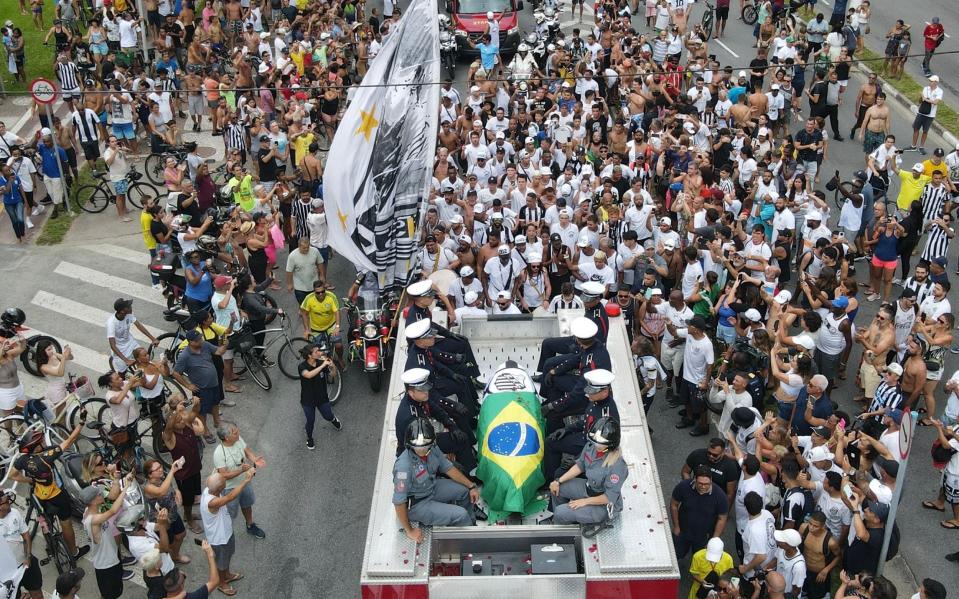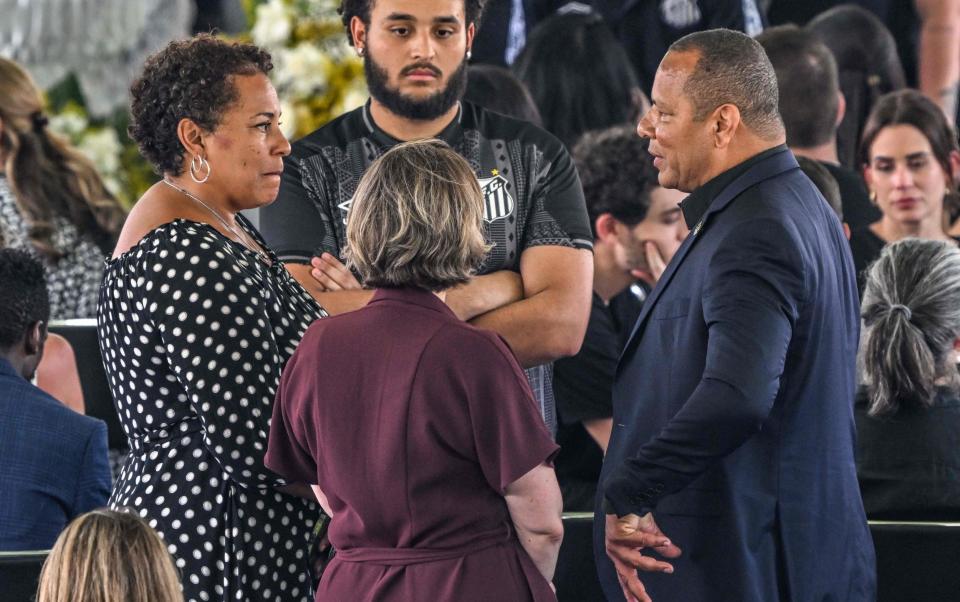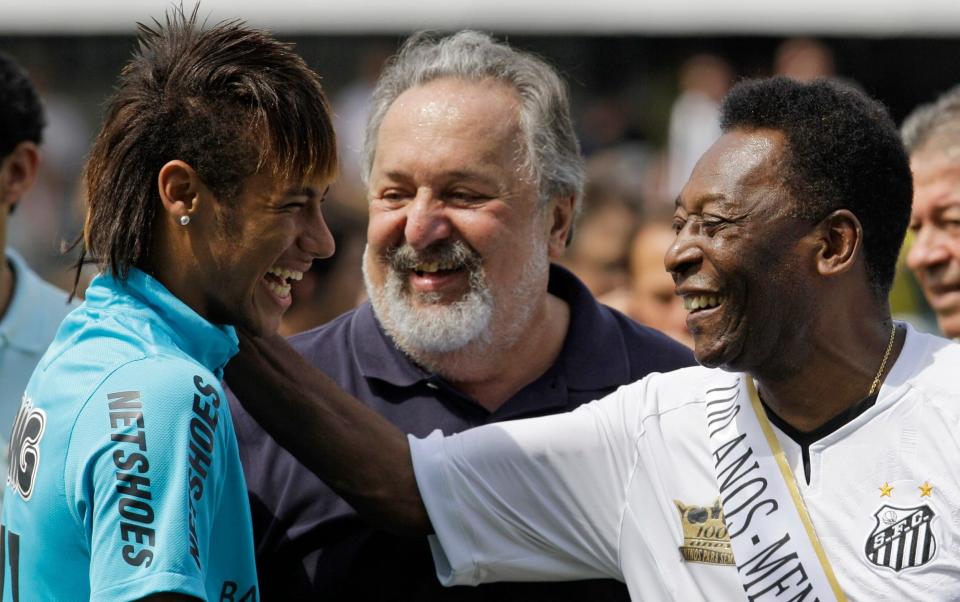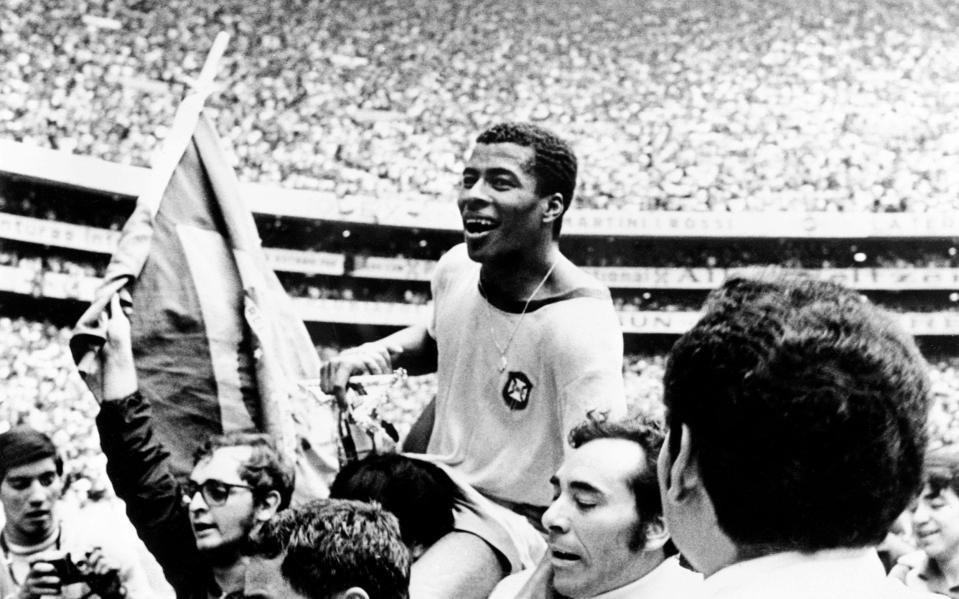
The 1980s Brazil international Walter Casagrande, a fearsome striker of the era and now a columnist with views just as robust, was unequivocal about the way in which Pele had been treated in death by his successors in the famous yellow shirt.
“The vast majority resent the King,” Casagrande wrote in his column on uol.com, “because when he was a pundit he was critical at times.” He did not stop there, taking aim at the current Brazil players as well as those who were part of the two squads that won the nation’s last two World Cups. “Not having any representative of these two at Pele’s wake,” Casagrande wrote, “was shameful for the history of Brazilian football.”
He accused the nation’s most famous players of not honouring the man who had launched Brazil’s football pre-eminence and in doing so become the country’s greatest ever cultural export. In Brazil, the absence of the greats, past and present, from Pele’s memorial in the streets and stadium of his hometown of Santos, the port city two hours from Sao Paulo, has reignited a row about the state of the country’s football.
For the most famous current player of them all, Neymar, the official word from his club Paris Saint-Germain was that he did not ask for permission to attend. He was represented by his father Neymar Senior, and the man himself was training at PSG on Monday, the day when Pele’s body was lying in state at Santos’s Vila Belmiro stadium where Neymar’s career was also launched.


Back from suspension, Neymar is, PSG say, under consideration for Friday’s French Cup tie. The wreath he sent to Pele’s funeral was certainly, according to those who saw it, hard to miss. He has in the past gained a certain notoriety for returning to Brazil for treatment on various injuries only to be pictured attending a sister’s birthday party or other such celebrations. The view from the players’ side is that none of them – either Neymar or any of those in the Premier League – would have been granted permission to leave their clubs.
Some have even suggested that it has become a political issue. The theory being that supporters of the newly re-elected president Luiz Inacio Lula da Silva, whose inauguration caused Pele’s memorials to be pushed back, are weaponising the non-attendance of players who supported his far-right rival Jair Bolsonaro.
As for those who do not have playing commitments any longer, the picture has been less clear. Of those two squads from 1994 and 2002, only Mauro Silva, from the former, attended the memorial services from Pele. He is now the president of the Sao Paulo football federation
Casagrande also noted that many players, including Cafu, Ronaldo and Ronaldinho from 2002, as well as Kaka, were only too happy to be paid guests of Qatar and Fifa at the World Cup finals. There they presided over the games in the VIP seats and were a constant backdrop to the games. From the former players themselves, the perspective is different. The Telegraph contacted representatives of some and was given a list of where various players were located when news broke on Dec 29 of Pele’s death.


It is convention in Brazil that burial takes place within 12 hours of death. Although that was eventually not the case for Pele, many felt that they simply would not make it back in time. Cafu himself was flying from Germany to Switzerland. Gilberto Silva was in Portugal; Kaka was in the United States; Ronaldinho was in Barcelona; Roberto Carlos was in Madrid; Bebeto was in Portugal. The list goes on. Rivaldo was in Brazil but felt that he would rather pay his respects privately.
There appears to be a fear among the players of accusations of posturing. Many of them have said privately that they will be back in Brazil in time for a mass planned to mark Pele’s death. It has also been noted that not all the surviving members of Pele’s 1970 World Cup winning team, including Rivellino and Jairzinho, attended the memorials. Their feelings about the public Pele and the private Edson Arantes do Nascimento are no secret. Yet, even so, it does feel like a moment has been lost.


The fifth largest country in the world, Brazil’s global reputation – for better or worse – centres upon football. That was a reputation built on the back of Pele: the dazzling teenager in monochrome from 1958 who became the giant of colour television in 1970 for his unmatched third World Cup triumph. His passing was a chance for the country to celebrate Pele and also demonstrate the great legacy of players who have followed him. The opportunity seems to have slipped past.
Pele was eventually laid to rest on Tuesday on the ninth floor of the Memorial Necropole Ecumenica in Santos, a 32-storey necropolis which lays claim to be the highest of its kind in the world. His coffin had previously sat for 24 hours at Vila Belmiro stadium and the ordinary fans had come to view it. Curiously a similar row over funeral attendance had blown up 40 years earlier when Pele’s great team-mate Garrincha had died at just 49, of cirrhosis of the liver.
When both were in the side, the national team had famously never lost. Yet in 1983, Pele, and many other famous players from the country’s past, did not attend Garrincha’s funeral. At the time there was criticism, notably from the pair’s former team-mate, the 1958 World Cup winning captain, Hilderaldo Bellini. He said the players’ behaviour set a bad example and contrasted with that of the ordinary people. “This proves,” he said then, “that the people do not forget their idols.”
